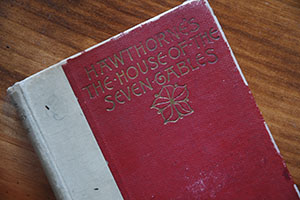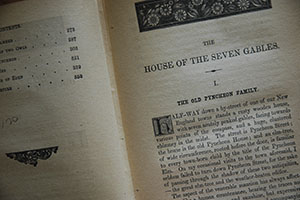The smell of antique paper
 My wife dropped by a thrift store today and got me a copy of Nathaniel Hawthorne's The House of Seven Gables, Salem Edition, Printed 1893. It looks "loved," but is still somewhat readable. All said, it's in pretty nice shape for a 116 year old.
My wife dropped by a thrift store today and got me a copy of Nathaniel Hawthorne's The House of Seven Gables, Salem Edition, Printed 1893. It looks "loved," but is still somewhat readable. All said, it's in pretty nice shape for a 116 year old.I enjoyed several authors throughout my schooling. Washington Irving, Henry David Thoreau, Hemingway and Ray Bradbury were among my favorite American authors, but few could compare to Nathaniel Hawthorne.
Hawthorne lived in the early to mid nineteenth-century and had credence that he lived under the guise of a family curse and thus changed his name to separate himself from a family's controversial lineage - particularly that of his great-great-grandfather who was a judge during the Salem witch trials.
 It isn't by accident that The House of Seven Gables is about a long string of consequences to generational sin that in many ways reflects Hawthorne's own fears. And it's an interesting question he poses: Does a person, like Phoebe, who lives out of human kindness and gentleness immune to that curse? His answer is that such people certainly experience pain, but they are redeemed by their own moral quality. Sadly, this is a strong humanistic world view rather than a Judea-Christian one where only God determines the rules that save us from contempt.
It isn't by accident that The House of Seven Gables is about a long string of consequences to generational sin that in many ways reflects Hawthorne's own fears. And it's an interesting question he poses: Does a person, like Phoebe, who lives out of human kindness and gentleness immune to that curse? His answer is that such people certainly experience pain, but they are redeemed by their own moral quality. Sadly, this is a strong humanistic world view rather than a Judea-Christian one where only God determines the rules that save us from contempt.Plotlines that reflect the soul of man to reveal anguish and helplessness, bound to evil intent by our own accord, and show a point of resolution through submission to universal moral law is lacking in today's novels about witches (Harry Potter) and vampires (Twilight). The contemporary books might someday be considered classics, though I suspect it to be more because of a fan base than because of its literary maturity, but they can never be ranked with the eloquent works of Hawthorne.









0 Comments:
Post a Comment<< Home